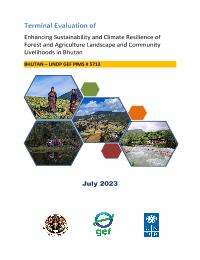
Terminal Evaluation - NAPA III – Enhancing Sustainable Resilient Livelihood
Output 1.1.1 Capacities developed across the whole of government to integrate the 2030 Agenda, the Paris Agreement and other international agreements in development plans and budgets, and to analyse progress towards the SDGs, using innovative and data-driven solutions
Output 1.1.2 Marginalised groups, particularly the poor, women, people with disabilities and displaced are empowered to gain universal access to basic services and financial and non-financial assets to build productive capacities and benefit from sustainable livelihoods and jobs
Output 1.2.1 Capacities at national and sub-national levels strengthened to promote inclusive local economic development and deliver basic services including HIV and related services
Goal 10. Reduce inequality within and among countries
Goal 13. Take urgent action to combat climate change and its impacts
Goal 15. Protect, restore and promote sustainable use of terrestrial ecosystems, sustainably manage forests, combat desertification, and halt and reverse land degradation and halt biodiversity loss
10.1 By 2030, progressively achieve and sustain income growth of the bottom 40 per cent of the population at a rate higher than the national average
13.1 Strengthen resilience and adaptive capacity to climate-related hazards and natural disasters in all countries
15.2 By 2020, promote the implementation of sustainable management of all types of forests, halt deforestation, restore degraded forests and substantially increase afforestation and reforestation globally
1: Environment
2: Others
3: Poverty



United Nations Sustainable Development Partnership Framework (UNSDPF) Outcome 4 - By 2023, Bhutan’s communities and its economy are more resilient to climate induced disasters and biodiversity loss as well as economic vulnerability